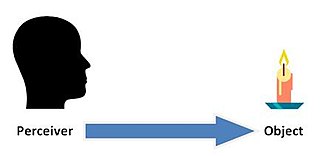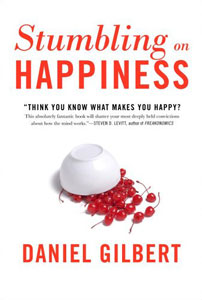Hedonism refers to the prioritization of pleasure in one's lifestyle, actions, or thoughts. The term can include a number of theories or practices across philosophy, art, and psychology, encompassing both sensory pleasure and more intellectual or personal pursuits, but can also be used in everyday parlance as a pejorative for the egoistic pursuit of short-term gratification at the expense of others.
Feelings are subjective self-contained phenomenal experiences. According to the APA Dictionary of Psychology, a feeling is "a self-contained phenomenal experience"; and feelings are "subjective, evaluative, and independent of the sensations, thoughts, or images evoking them". The term feeling is closely related to, but not the same as, emotion. Feeling may for instance refer to the conscious subjective experience of emotions. The study of subjective experiences is called phenomenology. Psychotherapy generally involves a therapist helping a client understand, articulate, and learn to effectively regulate the client's own feelings, and ultimately to take responsibility for the client's experience of the world. Feelings are sometimes held to be characteristic of embodied consciousness.

Happiness is a positive and pleasant emotion, ranging from contentment to intense joy. Moments of happiness may be triggered by positive life experiences or thoughts, but sometimes it may arise from no obvious cause. The level of happiness for longer periods of time is more strongly correlated with levels of life satisfaction, subjective well-being, flourishing and eudaimonia. In common usage, the word happy can be an appraisal of those measures themselves or as a shorthand for a "source" of happiness. As with any emotion, the precise definition of happiness has been a perennial debate in philosophy.
Positive psychology studies the conditions that contribute to the optimal functioning of people, groups, and institutions. It studies "positive subjective experience, positive individual traits, and positive institutions... it aims to improve quality of life."
Experience refers to conscious events in general, more specifically to perceptions, or to the practical knowledge and familiarity that is produced by these processes. Understood as a conscious event in the widest sense, experience involves a subject to which various items are presented. In this sense, seeing a yellow bird on a branch presents the subject with the objects "bird" and "branch", the relation between them and the property "yellow". Unreal items may be included as well, which happens when experiencing hallucinations or dreams. When understood in a more restricted sense, only sensory consciousness counts as experience. In this sense, experience is usually identified with perception and contrasted with other types of conscious events, like thinking or imagining. In a slightly different sense, experience refers not to the conscious events themselves but to the practical knowledge and familiarity they produce. Hence, it is important that direct perceptual contact with the external world is the source of knowledge. So an experienced hiker is someone who has actually lived through many hikes, not someone who merely read many books about hiking. This is associated both with recurrent past acquaintance and the abilities learned through them.

Subjective idealism, or empirical idealism or immaterialism, is a form of philosophical monism that holds that only minds and mental contents exist. It entails and is generally identified or associated with immaterialism, the doctrine that material things do not exist. Subjective idealism rejects dualism, neutral monism, and materialism; it is the contrary of eliminative materialism, the doctrine that all or some classes of mental phenomena do not exist, but are sheer illusions.
The Theory of Moral Sentiments is a 1759 book by Adam Smith. It provided the ethical, philosophical, economic, and methodological underpinnings to Smith's later works, including The Wealth of Nations (1776), Essays on Philosophical Subjects (1795), and Lectures on Justice, Police, Revenue, and Arms (1763).

In the philosophy of perception and philosophy of mind, direct or naïve realism, as opposed to indirect or representational realism, are differing models that describe the nature of conscious experiences; out of the metaphysical question of whether the world we see around us is the real world itself or merely an internal perceptual copy of that world generated by our conscious experience.
In the psychology of affective forecasting, the impact bias, a form of which is the durability bias, is the tendency for people to overestimate the length or the intensity of future emotional states.
Affective forecasting is the prediction of one's affect in the future. As a process that influences preferences, decisions, and behavior, affective forecasting is studied by both psychologists and economists, with broad applications.

A Treatise of Human Nature: Being an Attempt to Introduce the Experimental Method of Reasoning into Moral Subjects (1739–40) is a book by Scottish philosopher David Hume, considered by many to be Hume's most important work and one of the most influential works in the history of philosophy. The Treatise is a classic statement of philosophical empiricism, scepticism, and naturalism. In the introduction Hume presents the idea of placing all science and philosophy on a novel foundation: namely, an empirical investigation into human nature. Impressed by Isaac Newton's achievements in the physical sciences, Hume sought to introduce the same experimental method of reasoning into the study of human psychology, with the aim of discovering the "extent and force of human understanding". Against the philosophical rationalists, Hume argues that the passions, rather than reason, cause human behaviour. He introduces the famous problem of induction, arguing that inductive reasoning and our beliefs regarding cause and effect cannot be justified by reason; instead, our faith in induction and causation is caused by mental habit and custom. Hume defends a sentimentalist account of morality, arguing that ethics is based on sentiment and the passions rather than reason, and famously declaring that "reason is, and ought only to be the slave to the passions". Hume also offers a sceptical theory of personal identity and a compatibilist account of free will.
The hedonic treadmill, also known as hedonic adaptation, is the observed tendency of humans to quickly return to a relatively stable level of happiness despite major positive or negative events or life changes.
The economics of happiness or happiness economics is the theoretical, qualitative and quantitative study of happiness and quality of life, including positive and negative affects, well-being, life satisfaction and related concepts – typically tying economics more closely than usual with other social sciences, like sociology and psychology, as well as physical health. It typically treats subjective happiness-related measures, as well as more objective quality of life indices, rather than wealth, income or profit, as something to be maximized.

The primary–secondary quality distinction is a conceptual distinction in epistemology and metaphysics, concerning the nature of reality. It is most explicitly articulated by John Locke in his Essay concerning Human Understanding, but earlier thinkers such as Galileo and Descartes made similar distinctions.
Contentment is a state of being in which one is satisfied with their current situation, and the state of affairs in one’s life as they presently are. If one is content, they are pleased with their situation and how the elements in one’s life are situated. Contrary to popular belief, it is possible to be content with one’s life regardless of the circumstance, regardless of whether things are going as one expected or not.

The Paradox of Choice – Why More Is Less is a book written by American psychologist Barry Schwartz and first published in 2004 by Harper Perennial. In the book, Schwartz argues that eliminating consumer choices can greatly reduce anxiety for shoppers. The book analyses the behavior of different types of people. This book argues that the dramatic explosion in choice—from the mundane to the profound challenges of balancing career, family, and individual needs—has paradoxically become a problem instead of a solution and how our obsession with choice encourages us to seek that which makes us feel worse.

In philosophy of mind, qualia are defined as instances of subjective, conscious experience. The term qualia derives from the Latin neuter plural form (qualia) of the Latin adjective quālis meaning "of what sort" or "of what kind" in relation to a specific instance, such as "what it is like to taste a specific apple — this particular apple now".

Well-being, or wellbeing, also known as wellness, prudential value, prosperity or quality of life, is what is intrinsically valuable relative to someone. So the well-being of a person is what is ultimately good for this person, what is in the self-interest of this person. Well-being can refer to both positive and negative well-being. In its positive sense, it is sometimes contrasted with ill-being as its opposite. The term "subjective well-being" denotes how people experience and evaluate their lives, usually measured in relation to self-reported well-being obtained through questionnaires.
Subjective well-being (SWB) is a self-reported measure of well-being, typically obtained by questionnaire.
Well-being is a multifaceted topic studied in psychology, especially positive psychology. Biologically, well-being is highly influenced by endogenous molecules that impact happiness and euphoria in organisms, often referred to as "well-being related markers". Related concepts are eudaimonia, happiness, flourishing, quality of life, contentment, and meaningful life.








